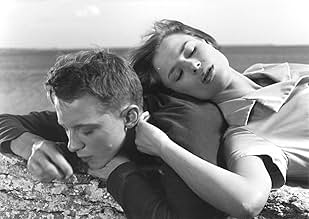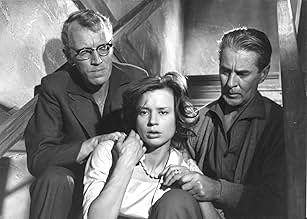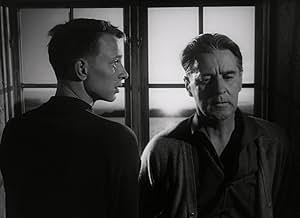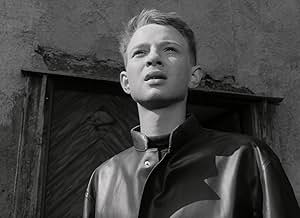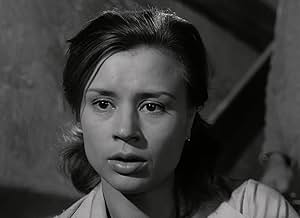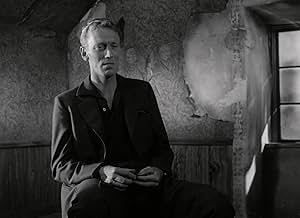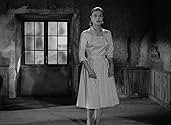CALIFICACIÓN DE IMDb
7.9/10
29 k
TU CALIFICACIÓN
Karin se reúne con su disfuncional familia en la isla que es su hogar tras recibir el alta de una institución psiquiátrica. La realidad se le escapa entre los dedos cuando empieza a creer qu... Leer todoKarin se reúne con su disfuncional familia en la isla que es su hogar tras recibir el alta de una institución psiquiátrica. La realidad se le escapa entre los dedos cuando empieza a creer que Dios la visita.Karin se reúne con su disfuncional familia en la isla que es su hogar tras recibir el alta de una institución psiquiátrica. La realidad se le escapa entre los dedos cuando empieza a creer que Dios la visita.
- Dirección
- Guionista
- Elenco
- Ganó 1 premio Óscar
- 3 premios ganados y 5 nominaciones en total
- Dirección
- Guionista
- Todo el elenco y el equipo
- Producción, taquilla y más en IMDbPro
Opiniones destacadas
This film's title is taken from the Bible: "For now we see through a glass, darkly; but then face to face: now I know in part; but then shall I know even as also I am known." (1 Cor 13:12).
The film is a major work of cinema and a major work of Bergman. If one looks at the body of Bergman's films he was probably approaching his peak of artistry, which he would achieve in his next work "Winter light", a film that Bergman himself called perfect. The reason most viewers do not grasp the importance of the magnificent "Man-God trilogy" or "the Silence trilogy" or "the Dark/Faith trilogy" (three films: "Through a glass darkly", "Winter light", and "the Silence") is that the trilogy deals with the theological question of God's existence. It is essentially a thinking person's film. If you can reflect on what you see, these three films are a treasurea treasure that influenced major directors several decades later, specifically Kieslowski who made "Three Colors: Blue" also almost entirely based on 1 Corinthians Chapter 13, Tarkovsky who seems to have borrowed some ideas like the sudden baptismal rain from this film that he employs in "Solyaris" and "Stalker" and finally the exciting new talent from Russia Andrei Zvyagintsev (director of "The Return", also taking a leaf from the Bergmanesque sonfather relationship). All these films seem to have been influenced by this seminal work of Bergman.
To those viewers, who are not spiritually inclined, the film could be reduced to the obvious action of Harriet Anderson's character Karin insisting on wearing goggles as she steps out of her home to live the rest of her life in a hospital. It could easily be interpreted as a study of mental illness, a film that gives credence to the theory that god does not exist. The film can equally be interpreted as a film on mad people who feel they are in communion with god, who at other times are slaves to dark forces (voices).
On the other hand one can argue the intensity of the light is a metaphor for a sign that God existsthe basic question that troubled Bergman, the son of a priest, in real life. Even the young Minus kneels down to pray to God as the rain (baptismal?) falls suddenly. A keen viewer will note that there is no sign of rain on island or of rain drenching men in an open boat soon after the event. Only Karin's hair is wet. All three films seek an answer that God exists from a silent, "inscrutable" (to quote a word from this film) God to whom millions pray. "Through a glass darkly" opens with a shot of the almost still, dark waters of the sea mirroring the sky. The film ends with several references of light. For the cynical, Bergman was disillusioned and felt that God was a "spider" (the intriguing image for the DVD covers of the three films), a reference to Karin's outburst towards the end of the film. If Bergman, was truly disillusioned, would he have added the final epilogue where the father tells his son "God exists in love, in every sort of love, maybe God is love." These last words make the son say my father has "talked to me" the penultimate words of the filma seemingly spiritual response even Jesus on the cross wanted ("Father, father, why hast thou forgotten me?") before he died.
It would be ridiculous to see this work merely as a film seeking answers to God's existence. Like "Three colors: Blue", this is a film on love. There is the undiluted love of an atheist husband (shades of Bergman?) for his ailing wife (note the film is dedicated to Kabi, Bergman's wife at a point when divorce was looming large). There is love of a father for his daughter, son and son-in-law triggered by a failed suicide attempt (only recalled in the film). There is love between siblings.
The film is also about marriage. Visually, the film emphasizes the wedding ring in the scenes involving husband (the camera captures the wedding ring on the finger several times) and wife (she puts it on after she washes her face). The son asks with an innocent cockiness of the father who has recently divorced his second wife Marianne (never shown on screen) if "he has lost all stability, spiritually"? Structurally Bergman doffs his cap to Shakespeare by adding a one act play within the film on the lines of "Hamlet" to drive home a point to the father and his illusion of love for his perfect work of art at the expense of depriving love for his near and dear.
In more ways than one, this is a thinking person's film. After viewing the film several times, one is in awe of this filmmaker so prolific, so perfect and so sensitive. What he has written for cinema can be compared to the output of great writers like Tolstoy and Shakespeare. He was truly a genius. I do agree with Bergman when he avers that the three films in the trilogy are not connected and are stand alone films. The only common link among the three films is Bergman's personal quest for a response from a silent God that his father believed in and in whom Bergman was brought up to believe in. These are not films of an atheist but works from a genius "flirting with God" to quote from the film itself.
Many years after he made the film, Bergman was uncomfortable with the final scene. The doubting Thomas in Bergman had resurfaced. Yet he never reworked on the film. The film has much to offer for a student of cinema: it is made of fine photography, art direction, acting, scriptwriting, editing and sound (Bach plus the horn of the lighthouse). Undoubtedly one of Bergman's finest works, it anticipates the perfect "Winter light," the next film that Bergman wrote and directed.
The film is a major work of cinema and a major work of Bergman. If one looks at the body of Bergman's films he was probably approaching his peak of artistry, which he would achieve in his next work "Winter light", a film that Bergman himself called perfect. The reason most viewers do not grasp the importance of the magnificent "Man-God trilogy" or "the Silence trilogy" or "the Dark/Faith trilogy" (three films: "Through a glass darkly", "Winter light", and "the Silence") is that the trilogy deals with the theological question of God's existence. It is essentially a thinking person's film. If you can reflect on what you see, these three films are a treasurea treasure that influenced major directors several decades later, specifically Kieslowski who made "Three Colors: Blue" also almost entirely based on 1 Corinthians Chapter 13, Tarkovsky who seems to have borrowed some ideas like the sudden baptismal rain from this film that he employs in "Solyaris" and "Stalker" and finally the exciting new talent from Russia Andrei Zvyagintsev (director of "The Return", also taking a leaf from the Bergmanesque sonfather relationship). All these films seem to have been influenced by this seminal work of Bergman.
To those viewers, who are not spiritually inclined, the film could be reduced to the obvious action of Harriet Anderson's character Karin insisting on wearing goggles as she steps out of her home to live the rest of her life in a hospital. It could easily be interpreted as a study of mental illness, a film that gives credence to the theory that god does not exist. The film can equally be interpreted as a film on mad people who feel they are in communion with god, who at other times are slaves to dark forces (voices).
On the other hand one can argue the intensity of the light is a metaphor for a sign that God existsthe basic question that troubled Bergman, the son of a priest, in real life. Even the young Minus kneels down to pray to God as the rain (baptismal?) falls suddenly. A keen viewer will note that there is no sign of rain on island or of rain drenching men in an open boat soon after the event. Only Karin's hair is wet. All three films seek an answer that God exists from a silent, "inscrutable" (to quote a word from this film) God to whom millions pray. "Through a glass darkly" opens with a shot of the almost still, dark waters of the sea mirroring the sky. The film ends with several references of light. For the cynical, Bergman was disillusioned and felt that God was a "spider" (the intriguing image for the DVD covers of the three films), a reference to Karin's outburst towards the end of the film. If Bergman, was truly disillusioned, would he have added the final epilogue where the father tells his son "God exists in love, in every sort of love, maybe God is love." These last words make the son say my father has "talked to me" the penultimate words of the filma seemingly spiritual response even Jesus on the cross wanted ("Father, father, why hast thou forgotten me?") before he died.
It would be ridiculous to see this work merely as a film seeking answers to God's existence. Like "Three colors: Blue", this is a film on love. There is the undiluted love of an atheist husband (shades of Bergman?) for his ailing wife (note the film is dedicated to Kabi, Bergman's wife at a point when divorce was looming large). There is love of a father for his daughter, son and son-in-law triggered by a failed suicide attempt (only recalled in the film). There is love between siblings.
The film is also about marriage. Visually, the film emphasizes the wedding ring in the scenes involving husband (the camera captures the wedding ring on the finger several times) and wife (she puts it on after she washes her face). The son asks with an innocent cockiness of the father who has recently divorced his second wife Marianne (never shown on screen) if "he has lost all stability, spiritually"? Structurally Bergman doffs his cap to Shakespeare by adding a one act play within the film on the lines of "Hamlet" to drive home a point to the father and his illusion of love for his perfect work of art at the expense of depriving love for his near and dear.
In more ways than one, this is a thinking person's film. After viewing the film several times, one is in awe of this filmmaker so prolific, so perfect and so sensitive. What he has written for cinema can be compared to the output of great writers like Tolstoy and Shakespeare. He was truly a genius. I do agree with Bergman when he avers that the three films in the trilogy are not connected and are stand alone films. The only common link among the three films is Bergman's personal quest for a response from a silent God that his father believed in and in whom Bergman was brought up to believe in. These are not films of an atheist but works from a genius "flirting with God" to quote from the film itself.
Many years after he made the film, Bergman was uncomfortable with the final scene. The doubting Thomas in Bergman had resurfaced. Yet he never reworked on the film. The film has much to offer for a student of cinema: it is made of fine photography, art direction, acting, scriptwriting, editing and sound (Bach plus the horn of the lighthouse). Undoubtedly one of Bergman's finest works, it anticipates the perfect "Winter light," the next film that Bergman wrote and directed.
This was the first Bergman movie I ever watched. Consequently, it holds sort of a special place in my catalogue of movie memories.
I enjoyed the depiction of the numerous relationships between people or objects which were kept apart by walls or a "dark glass." The artist and the fullness of what he/she is attempting to depict, mankind and God, and more particularly in the film, between Minus and women, Minus and David, etc..
The most gripping, however, were the relationship between David and Karin, and between Karin and "God." I'm not going to get into detail for the sake of those who haven't seen the film. But Bjornstrand's line about the "magic circle" we draw around ourselves instantly vaulted close to the top of my list of movie lines which have impacted me.
Lastly, I appreciated how the von Sydow character, Martin, acted as a representation of what love is not, i.e. his desire to always do the right thing, rather than the honest thing.
I enjoyed the depiction of the numerous relationships between people or objects which were kept apart by walls or a "dark glass." The artist and the fullness of what he/she is attempting to depict, mankind and God, and more particularly in the film, between Minus and women, Minus and David, etc..
The most gripping, however, were the relationship between David and Karin, and between Karin and "God." I'm not going to get into detail for the sake of those who haven't seen the film. But Bjornstrand's line about the "magic circle" we draw around ourselves instantly vaulted close to the top of my list of movie lines which have impacted me.
Lastly, I appreciated how the von Sydow character, Martin, acted as a representation of what love is not, i.e. his desire to always do the right thing, rather than the honest thing.
Between 1957-1963, Ingmar Bergman directed seven films. In my mind, there has never been such an amazingly creative period for a director as the six years between Wild Strawberries and The Silence. Through a Glass Darkly stands out to me as not only the masterpiece of this era, but of Bergman's entire career. This film has such a distinct atmosphere, which conveys not only isolation and melancholy, but also dark, austere beauty. Every little piece of this film fits together like a glorious completed puzzle. The Bach playing over the opening credits. The cinematography, with long, meditative shots in glowing black and white. The performances turned in by Harriet Andersson, Gunner Bjornstrand, and Bergman regular Max von Sydow. Overall, I sense that Bergman's vision is so obviously being displayed on the screen, as if his soul is being laid bare. As a singular piece of art, it is just staggering to behold. I think that everyone has albums or films that they connect with certain periods in their life, that transcend the mundane and just touch you in a profound way. Through a Glass Darkly is one for me. A must see.
this is one of bergman's most serious and devastating, sometimes horribly depressing and (it's only flaw) a little too heavy handed for even the toughest and healthiest viewers. it is fascinating to watch bergman come to terms with the absence of god and man's tragic isolation in an indifferent universe through the art he uses like no one else could or does, the art of film. karin is a mentally disordered young woman, intensely loved by her family and well cared for but nonetheless subject to bouts of extreme madness and delusions of divinity that are so convincing and well performed as to be hard to watch (particularly the scene where she is convinced that a deity disguised as a spider is going to crawl out of a closet). although it ends on a semi hopeful note, the film's atmosphere is largely one of sterility, emotional dryness, impoverishment and despair. karin lives on an isolated island just as we inhabit a vast, incomprehensible universe that is essentially little but a doomed speck of dust in a monstrous cosmos that does not care. i think there can be little debate as to the correct interpretation of this movie, which is the utter void at the center of false human beliefs and illusions of happiness or omnipotence. order is a lie and religious belief is founded on deliberate self deception. a masterpiece of the most passionate artistry and integrity.
Well, we don't see darkly through a glass, and Bergman explains in his "Introductions" that during the ancient times, there were no glass, the mirrors were made of metal, bronze, for instance and while looking through the metal mirror, the face and the background appear darker than in reality. Does it mean that when we look inside ourselves like in the mirror, we appear darker and more sinister than we are? Or the other way around?
"Through a Glass Darkly" is a typically great Bergman's film - four people arrive to an isolated island to spend a few days together, a young woman, her husband, father, and brother. They seem to love one another and are perfectly happy and comfortable in the beginning. It does not last long - not in the Bergman's world. Harriet Anderson was amazing as Karin, a mentally sick young woman, who was just released from the hospital but I believe three other actors playing Father (Gunnar Bjornstrand), Husband (Max von Sydow), and Brother (Lars Passgård) were as good as she was. The Father was especially interesting - he was a reason Karin became ill on the first place and his diary sent her to the total mental breakdown. As with "Persona" and "Autumn Sonata", Bergman is asking again how far is an Artist willing to go for his Art? Here, Father, the writer wants to be a cool and remote observer of his daughter's mental tragedy as a study for his future work. There is a hope, though, in the end. Not for Karin - it is too late for her - but for her confused young brother who is also fighting for his sanity and desperately needs his father's love and understanding. His last words - "Daddy talked to me" - give this bleak and tragic story the hope that his life could be different. Or maybe not...
"Through a Glass Darkly" is a typically great Bergman's film - four people arrive to an isolated island to spend a few days together, a young woman, her husband, father, and brother. They seem to love one another and are perfectly happy and comfortable in the beginning. It does not last long - not in the Bergman's world. Harriet Anderson was amazing as Karin, a mentally sick young woman, who was just released from the hospital but I believe three other actors playing Father (Gunnar Bjornstrand), Husband (Max von Sydow), and Brother (Lars Passgård) were as good as she was. The Father was especially interesting - he was a reason Karin became ill on the first place and his diary sent her to the total mental breakdown. As with "Persona" and "Autumn Sonata", Bergman is asking again how far is an Artist willing to go for his Art? Here, Father, the writer wants to be a cool and remote observer of his daughter's mental tragedy as a study for his future work. There is a hope, though, in the end. Not for Karin - it is too late for her - but for her confused young brother who is also fighting for his sanity and desperately needs his father's love and understanding. His last words - "Daddy talked to me" - give this bleak and tragic story the hope that his life could be different. Or maybe not...
¿Sabías que…?
- TriviaThe first Ingmar Bergman film to be made on the island of Fårö. Bergman would later buy a home on the island.
- ErroresAs Minus paints the chair, the amount of paint on the chair changes between shots.
- Créditos curiososThere are no end credits. After Minus (Lars Passgård) says the final line, the film fades to black and ends. The entire cast and crew were credited at the start, and there isn't even a "Fin" or "Ende".
- ConexionesFeatured in Reel Radicals: The Sixties Revolution in Film (2002)
- Bandas sonorasSarabande from Suite No. 2 in D minor for Violoncello
Written by Johann Sebastian Bach
Performed by Blondal Bengston.
Selecciones populares
Inicia sesión para calificar y agrega a la lista de videos para obtener recomendaciones personalizadas
- How long is Through a Glass Darkly?Con tecnología de Alexa
Detalles
Taquilla
- Total a nivel mundial
- USD 8,939
- Tiempo de ejecución
- 1h 30min(90 min)
- Color
- Mezcla de sonido
- Relación de aspecto
- 1.37 : 1
Contribuir a esta página
Sugiere una edición o agrega el contenido que falta


